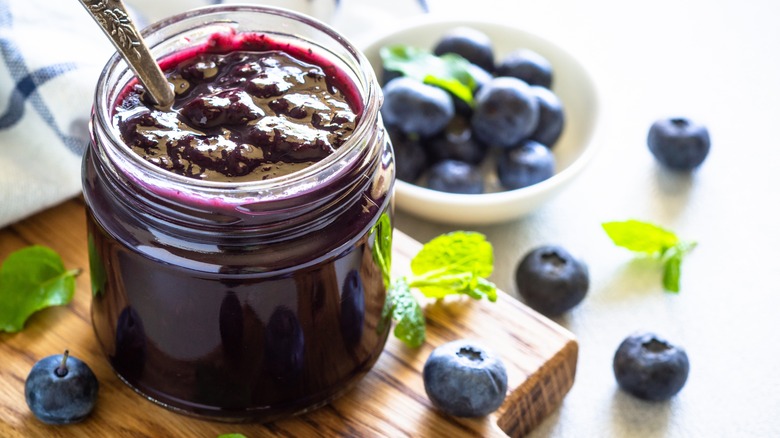
Rich in antioxidants, blueberries provide both delicious taste and nutritional benefits. According to My Food Data, a one-cup serving contains only 84 calories and 3.6 grams of fiber. It also delivers 16% of the daily recommended vitamin C intake, 24% of the daily requirement for vitamin K, and 22% of the daily allowance of manganese. These small fruits are also abundant in phenolic acids, quercetin, anthocyanidins, and other compounds with antioxidant properties (via the Journal of Zhejiang University Science B). But what occurs when you consume too many blueberries?
Most fruits, including blueberries, are relatively high in fiber. Duke University warns that excessive consumption of fiber can lead to bloating, gas, diarrhea, and mineral deficiencies. Generally, women should not exceed 25 grams of dietary fiber per day, while men should aim for about 38 grams. Although it’s unlikely to consume an excessive amount of fiber from blueberries alone, eating three or four cups of berries may cause bloating, especially if your fiber intake increases rapidly.
Even the healthiest foods can be detrimental when eaten in large quantities, and blueberries are no exception. Here’s what you should know about their potential side effects.
Blueberries can trigger allergies

Blueberries contain specific allergens that might lead to undesirable side effects. According to Allergy Resources, blueberries have lipid transfer proteins that can provoke allergic reactions. These proteins are present in the skin or seeds of foods and are not easily broken down by the digestive system, as noted by Allergy UK. Symptoms of a lipid transfer protein allergy may include facial swelling, stomachache, vomiting, breathing difficulties, and a rash.
Blueberries are also high in salicylates, containing 27.6 milligrams per 100 grams, as reported by Family Medicine Austin. Salicylates naturally occur in various fruits, vegetables, and spices, and synthetic versions are found in some pain relievers and products like shaving creams, sunscreens, and mouthwashes. People sensitive or allergic to salicylates may experience symptoms such as rashes, headaches, diarrhea, stomach pain, hives, and inflammation (via WebMD). If you’re allergic or sensitive to these compounds, you might still be able to consume blueberries in small amounts, according to Family Medicine Austin.
Too many blueberries can interfere or interact with medication

As previously mentioned, blueberries provide 24% of the daily recommended vitamin K intake per cup. This fat-soluble nutrient supports blood clotting and bone health, as noted by Oregon State University. However, it can interact with warfarin and other blood thinners, increasing the risk of bleeding. Individuals on blood thinners should not exceed the recommended daily amount of vitamin K, which is 90 micrograms for adult women and 120 micrograms for men. They should also avoid significant fluctuations in their daily vitamin K intake.
Because blueberries could lower blood sugar levels, the National Library of Medicine indicates this might cause your blood sugar to drop too low if you’re taking diabetes medication. Therefore, it’s important to monitor your blood sugar levels if you consume large amounts of blueberries. Aside from these scenarios, eating excessive blueberries is unlikely to cause major issues.
Impact on blood sugar and triglycerides

Blueberries contain over 21 grams of carbs, including 14.7 grams of sugar per cup. However, most of the sugars in blueberries are glucose and fructose, both monosaccharides, though metabolized differently. Glucose raises blood sugar more rapidly, while fructose gradually increases blood sugar and has less impact on insulin levels, according to Healthline. Notably, berries also contain anthocyanins, which have been shown to help reduce blood sugar levels after starchy meals, according to a 2005 review in BioFactors.
However, a 2015 review from the Journal of the American Heart Association found that consuming more fructose than 20% of your daily calorie needs could increase blood triglycerides, potentially affecting heart health. The U.S. Department of Agriculture recommends about 1 ½ to 2 cups of fruits per day for adult women and 2 to 2½ cups per day for adult men. Eating blueberries daily can help you get more vitamins, minerals, and antioxidants into your diet – just be cautious not to overindulge.




